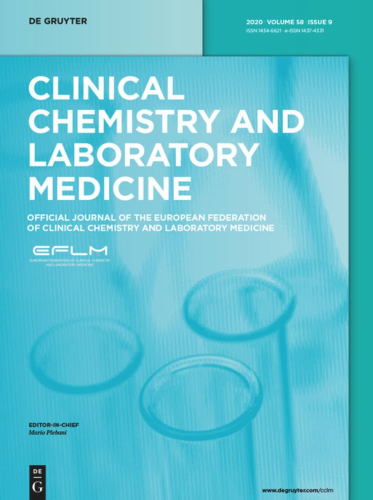An ultrasensitive DNA-enhanced amplification method for detecting cfDNA drug-resistant mutations in non-small cell lung cancer with selective FEN-assisted degradation of dominant somatic fragments
IF 3.8
2区 医学
Q1 MEDICAL LABORATORY TECHNOLOGY
引用次数: 0
Abstract
Objectives Blood cell-free DNA (cfDNA) can be a new reliable tool for detecting epidermal growth factor receptor (通过选择性 FEN 辅助降解显性体细胞片段,检测非小细胞肺癌 cfDNA 耐药突变的超灵敏 DNA 增强扩增方法
目的 血中无细胞DNA(cfDNA)是检测非小细胞肺癌(NSCLC)患者表皮生长因子受体(EGFR)突变的一种新的可靠工具。然而,由于灵敏度、稳定性或突变检测率方面的缺陷,目前报道的 cfDNA 检测方法在检测耐药突变方面的作用有限。方法 我们开发了一种基于Archaeoglobus fulgidus衍生的瓣膜内切酶(Afu FEN)的DNA增强扩增系统,通过设计一对发夹探针与野生型cfDNA退火形成两个5′瓣膜,使Afu FEN能特异性地裂解野生型cfDNA,从而扩增突变的cfDNA。当占优势的野生型体细胞 cfDNA 片段被结构识别特异性 Afu FEN 裂解时,反应体系中突变的 cfDNA 比例大大增加。通过 PCR 扩增,体系中突变的 cfDNA 数量进一步增加,从而可以通过第一代测序轻松检测突变状态。结果 在合成野生型和 T790M 表皮生长因子受体 DNA 片段的混合物中,我们的新检测方法仍能在 fg 水平检测到 T790M 突变,灵敏度非常高。我们还测试了它在检测 NSCLC 患者临床样本中低变异等位基因频率(VAF)突变方面的性能。低 VAF(0.1% 和 0.5%)的血浆 cfDNA 样本很容易通过 DNA 增强扩增检测到。结论 该系统对突变的 cfDNA 进行了增强扩增,可快速、灵敏、经济地检测肿瘤中的耐药突变,是用于 NSCLC 早期筛查和个体化靶向治疗的有效工具。
本文章由计算机程序翻译,如有差异,请以英文原文为准。
求助全文
约1分钟内获得全文
求助全文
来源期刊
CiteScore
11.30
自引率
16.20%
发文量
306
审稿时长
3 months
期刊介绍:
Clinical Chemistry and Laboratory Medicine (CCLM) publishes articles on novel teaching and training methods applicable to laboratory medicine. CCLM welcomes contributions on the progress in fundamental and applied research and cutting-edge clinical laboratory medicine. It is one of the leading journals in the field, with an impact factor over 3. CCLM is issued monthly, and it is published in print and electronically.
CCLM is the official journal of the European Federation of Clinical Chemistry and Laboratory Medicine (EFLM) and publishes regularly EFLM recommendations and news. CCLM is the official journal of the National Societies from Austria (ÖGLMKC); Belgium (RBSLM); Germany (DGKL); Hungary (MLDT); Ireland (ACBI); Italy (SIBioC); Portugal (SPML); and Slovenia (SZKK); and it is affiliated to AACB (Australia) and SFBC (France).
Topics:
- clinical biochemistry
- clinical genomics and molecular biology
- clinical haematology and coagulation
- clinical immunology and autoimmunity
- clinical microbiology
- drug monitoring and analysis
- evaluation of diagnostic biomarkers
- disease-oriented topics (cardiovascular disease, cancer diagnostics, diabetes)
- new reagents, instrumentation and technologies
- new methodologies
- reference materials and methods
- reference values and decision limits
- quality and safety in laboratory medicine
- translational laboratory medicine
- clinical metrology
Follow @cclm_degruyter on Twitter!

 求助内容:
求助内容: 应助结果提醒方式:
应助结果提醒方式:


